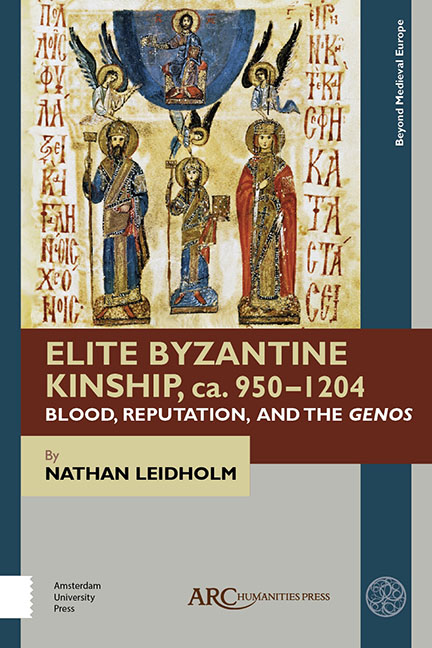Book contents
- Fronrtmatter
- Contents
- List of Abbreviations
- Abbreviation
- Acknowledgements
- Introduction
- Chapter 1 Defining “the Family” in Byzantine Sources and the Modern Historiography
- Chapter 2 The Language of Kinship
- Chapter 3 Marriage Impediments and the Concept of Family
- Chapter 4 Interrogating Consanguinity in a Byzantine Context
- Chapter 5 Family Names and the Politics of Reputation
- Chapter 6 Kinship and Political Developments of the Eleventh and Twelfth Centuries
- Conclusion
- Select Bibliography
- Index
Chapter 2 - The Language of Kinship
Published online by Cambridge University Press: 20 November 2020
- Fronrtmatter
- Contents
- List of Abbreviations
- Abbreviation
- Acknowledgements
- Introduction
- Chapter 1 Defining “the Family” in Byzantine Sources and the Modern Historiography
- Chapter 2 The Language of Kinship
- Chapter 3 Marriage Impediments and the Concept of Family
- Chapter 4 Interrogating Consanguinity in a Byzantine Context
- Chapter 5 Family Names and the Politics of Reputation
- Chapter 6 Kinship and Political Developments of the Eleventh and Twelfth Centuries
- Conclusion
- Select Bibliography
- Index
Summary
Τίμιος ὁ θάνατος ἀƛηθῶς τῶν ὑπὲρ τοῦ γένους καὶ τοῦ φύƛου χριστιανῶν τϵτϵƛϵυτηκότων ἐν δϵσμοῖς καὶ ποƛέμοις, ὧν σήμϵρον τὴν μνήμην ἐπιτϵƛοῦμ ϵν πιστῶς.
Truly honourable is the death of those who have fallen in captivity and in wars on behalf of the genos and the nation of Christians, whose memory we faithfully celebrate today.
Tenth-century office (akolouthia) for those who have died in battleBY THE MIDDLE of the twelfth century, the genos played a much greater role in Byzantine politics and aristocratic society than it had two centuries earlier. The process by which the concept moved to the centre of aristocratic identity is particularly visible in the language of the sources. At the same time, changes associated with the definition and role of the term genos between the early tenth and the late twelfth centuries were accompanied by other, more sweeping changes in the vocabulary of kinship occurring in Byzantine society. The nature of these developments sheds valuable light on the changing social and cultural significance of the genos and of kinship more broadly.
The tenth and eleventh centuries were marked by important changes in the vocabulary of kinship employed by the sources. The period witnessed the language of kinship becoming much more precise than it had previously been, while authors also display much more interest in recording kin relations in their works, whether using older or newer vocabulary to do so. The language of adoption and even baptism became more firmly linked in language and significance, while affinal relationships gained new vocabulary to reflect their growing significance in marriage alliances and social relations. Importantly, the genos and its related vocabulary appears with much greater frequency as the period covered here progresses, in many cases taking precedence over other forms of “the family.” At the same time, a specific vocabulary for describing the genos came to be widely recognized and utilized, with certain sets of assumptions and valuations encoded within it.
The genos gradually earned a central role in the Byzantine vocabulary of kinship, and, as part of this process, the specific language of the genos achieved near-codification, both in the use of the term itself and in the language associated with it.
- Type
- Chapter
- Information
- Elite Byzantine Kinship, ca. 950–1204Blood, Reputation, and the Genos, pp. 37 - 62Publisher: Amsterdam University PressPrint publication year: 2019

